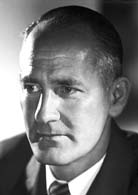 George Wells Beadle (October 22, 1903 – June 9, 1989) was a geneticist who received the Nobel Prize in Physiology or Medicine Nobel laureate with Edward Lawrie Tatum for discovering the role of genes in regulating biochemical events within cells.
George Wells Beadle (October 22, 1903 – June 9, 1989) was a geneticist who received the Nobel Prize in Physiology or Medicine Nobel laureate with Edward Lawrie Tatum for discovering the role of genes in regulating biochemical events within cells.
Beadle received a B.Sc. degree at the University of Nebraska in 1926 and M.Sc. in 1927. He then obtained his Ph.D. from Cornell in 1931.
In 1936 Beadle left the California Institute of Technology to become Assistant Professor of Genetics at Harvard University. A year later he was appointed Professor of Biology (Genetics) at Stanford University and there he remained for nine years, working for most of this period in collaboration with Tatum.
During his career, Beadle has received many honours. These include the Hon. D.Sc. of the following Universities: Yale (1947), Nebraska (1949), Northwestern University (1952), Rutgers University (1954), Kenyon College (1955), Wesleyan University (1956), Birmingham University and Oxford University, England (1959), Pomona College (1961), and Lake Forest College (1962). In 1962 he was also given the honorary degree of LL.D. by the University of California, Los Angeles. He also received the Lasker Award of the American Public Health Association (1950), the Dyer Award (1951), the Emil Christian Hansen Prize of Denmark (1953), the Albert Einstein Commemorative Award in Science (1958), the Nobel Prize in Physiology or Medicine 1958 with E.L. Tatum and J. Lederberg, the National Award of the American Cancer Society (1959), and the Kimber Genetics Award of the National Academy of Sciences (1960).
He was a member of several learned societies, among which the National Academy of Sciences (Chairman of Committee on Genetic Effects of Atomic Radiation), the Genetics Society of America (President in 1946), the American Association for the Advancement of Science (President in 1955), the American Cancer Society (Chairman of Scientific Advisory Council), the Royal Society of London, and the Danish Royal Academy of Science.